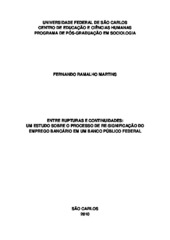Entre rupturas e continuidades : um estudo sobre o processo de re-significação do emprego bancário em um banco público federal

Ver/
Fecha
2010-12-17Autor
Martins, Fernando Ramalho
Metadatos
Mostrar el registro completo del ítemResumen
The object of this study is the perceptions and meanings attributed to the public bank employment by employees of a federal bank. The 1990s were a decade of dramatic changes, marked by fusions, acquisitions and privatizations of public banks, intensification of work through expressive extinctions of formal jobs, precariousness of work relations, outsourcing and wage patterns deterioration and, at the same time, profits recovering at the end of the period. Thus, this study aimed to investigate and analyze how the employees of the target bank perceive bank work after the changes produced by the 1990s restructuring process. The first step was to analyze the productive restructuring process on the sector and its implications on work and workers. The second step was to try to characterize the major facts and changes occurred in the bank during the 1990s and early 2000s, via analysis of documents available at Centro de Documentação do Sindicato dos Bancários de São Paulo (documentation department of to the bank workers union in São Paulo). Finally, semistructured interviews were carried out with two groups of workers; group one consisted of ten clerks, staff hired up to 1989, who went through the sector restructuring; group two consisted of ten bank technicians, representing the new generation of bank workers, hired after the 1998 recruitment process. We started from the hypothesis that the mode how the public bank work is perceived by bank workers was negatively affected by changes occurred in the sector in the 1990s, which impacted on the employees mode of being and acting. As a second hypothesis, we believe that such re-signification can only be understood in the light of a process of significant ideological and institutional changes inherent to the flexible capitalism. We found that, for the new generation of bank workers, the perception originated from a synchronic comparison, where the job appears as an alternative to temporary, unstable or flexible work experiences, seems to shape the perception originated from a diachronic analysis, which evinces the historical losses of bank work. Increasing individualism, bradescalização of relations, creation of castes, hierarchical seduction in a context of limited possibilities of career ascension and basic rate of pay deterioration, and reduction of trade union involvement were elements explored by the analysis, which revealed that, considering what remained and what has changed, the stability issue seems to be the central element in the perception and meaning attributed do work, for both groups of workers. Thus, a process involving disruptions and continuities characterizes the re-signification of public bank employment. The disruptions, insofar as the meaning of work is no longer supported by the combination stability-status-wage and through the attenuation of the sense of belonging to a professional category. The continuities, insofar as the stability associated to employment keeps and increases its importance against the current configuration of the world of work, as well by the return and intensification of a trend already present in the pre-restructuring, represented by the idea of temporariness of bank employment.